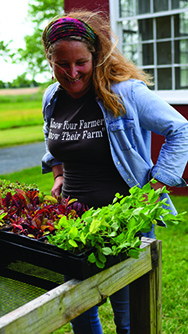
Prior to the pandemic Jena Paice noted a growing trend towards gardening to provide safe, locally grown food for one’s family. (Photo courtesy Jena Paice)
Jena Paice has had a winning way with veggies throughout her 20-year organic farming adventure.
The Talbot County cultivator, branded as Spirit Grower, has gained local renown and loyal customers, among them several area eateries, and home gardeners, who rave about her transplants in tasty varieties and vigor not readily available at larger venues.
Besides a wealth of skill and experience, Paice brings a burning passion for teaching successful sowing secrets.
Her love for helping people discover the rewards of planting was brought home to her while doing gardening programs with school children.
A light bulb moment occurred after realizing that, to really reach kids, “I first need to get the parents involved,” she recalled.
Active in the St. Michael’s Farmers Market (as board member, vice president and now president), Paice informally advises anyone stopping by her stand to purchase produce and transplants.
But she also lists a consulting service on her website, spiritgrower.com, and she said response has grown steadily.
This year she’s adding a series of workshops at her farm and greenhouse at Langdon Estates in Sherwood providing demos of how to plant, prune, stake and fertilize.
Prior to the pandemic she’d noted a growing trend towards gardening to provide safe, locally grown food for one’s family.
In some ways, the pandemic accelerated this movement, she added. Facing seasons of uncertainty, gardening helped provide physical sustenance, but beyond that, it provided a stimulating and rewarding home-based activity to cope with isolation and boredom. It also helped generate a much-needed sense of calm, control, and continuity, Paice said.
Among her clients are families, couples, singles and seniors.
“There are couples in their 50s just wanting a little garden, huge families with lots of kids wanting to till the soil at their weekend home, one with an outdoor kitchen, and a woman looking to get her veggie beds off ‘on the right foot.’ Yesterday a mom got in touch to ask about soils,” Paice recalled.
She regularly advises customers visiting her stand Saturdays at the St. Michaels’ Farmers Market (opening April 10) but welcomes questions via her website.
“When someone buys my plants they’re immediately in the tribe, and I’m glad to help them,” Paice added, with a smile.
Even with a smattering of knowledge, it’s easy to make mistakes right off the bat, she said.
“Initial things I hear are ‘Oh, my gosh, I didn’t know I should have this mix of soil, or I should have my soil level up to the top of my bed for better air flow and disease prevention, and, it’s better to have a bed that doesn’t become soggy and sag into a swimming pool for vegetables.’ They just need some basic advice,” she said.
But Paice takes care to keep her instructions easy to grasp.
“When I started, I sensed easily going down a rabbit hole explaining things; I didn’t want people to get scared off. I wanted it to make sense,” she related.
Some people just want questions answered then follow through on their own, she added. Others need a plan and prefer everything planted for them. For those feeling overwhelmed quickly, Paice provides not only rescue but helpful hands-on instruction.
“Obviously it’s nice to be compensated, but for me the most rewarding part involves teaching people, who can then teach their children,” she said.
Paice said she starts new clients with a two-hour visit to get the lay of the landscape and a vision for the future — considering whether the garden will be grown on top of the land, and if so, how much to raise the soil level; can existing raised beds be used or do new ones need to be built; is tree work needed to create more light; and are weeds bad enough to require extended tarping?
“Next, we’d figure out a plan,” Paice added, including how to build bed boxes, and consider if there’s time to start with seeds or go with half seeds and half transplants.
While seasonal timing is important, for peppers, tomatoes and other finicky varieties for the first time she highly recommends transplants to produce the most successful crops.
But first she finds out what they (and their kids) like to eat and would like to try.
“I’ve found through the years people will plant a lot of things they won’t actually eat,” she commented. “What they don’t realize is they might end up growing quite a lot, so I want it to be a place of abundance that their family will enjoy. Most people don’t realize that, thanks to tunnels and covers, you can actually grow in your garden all but two months out of the year. Some clients were picking greens out of their garden well into February.”



